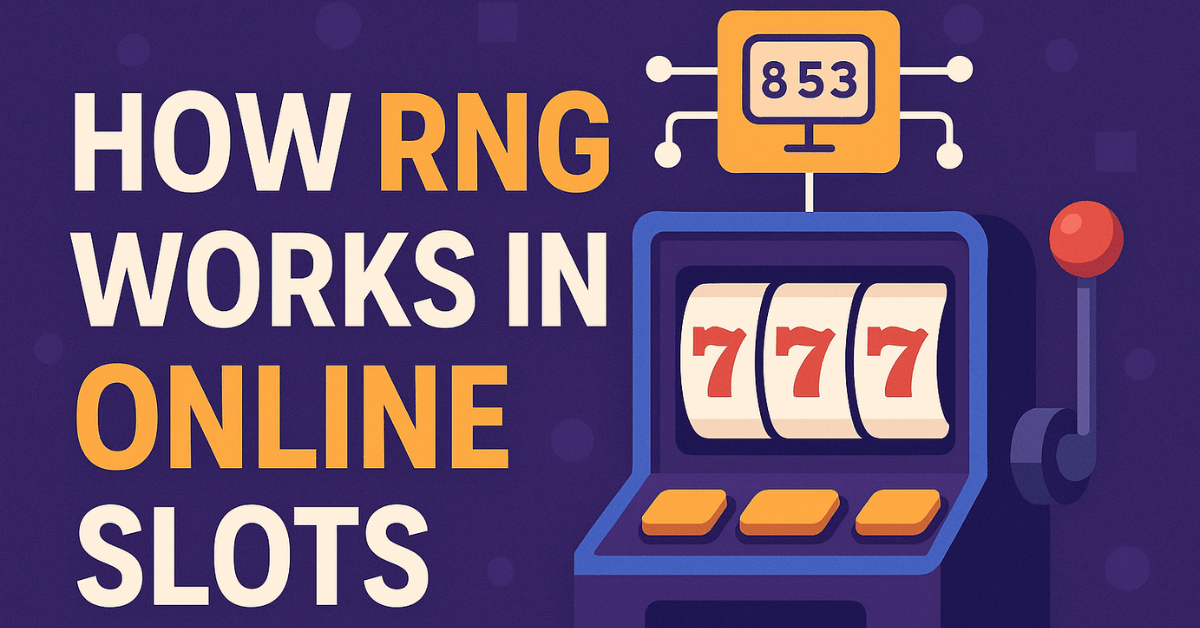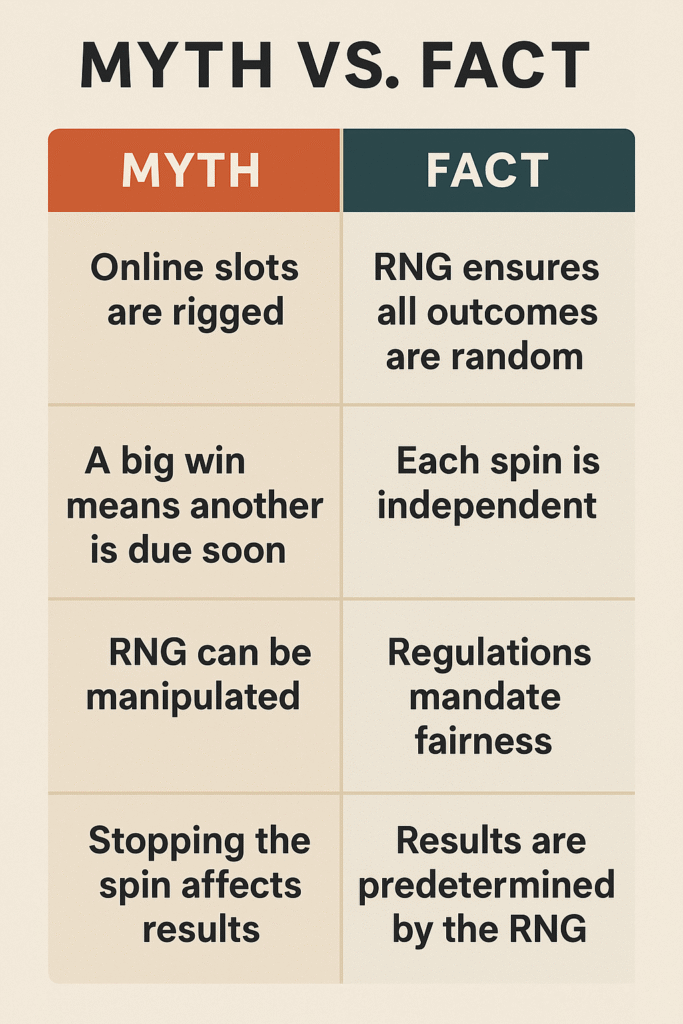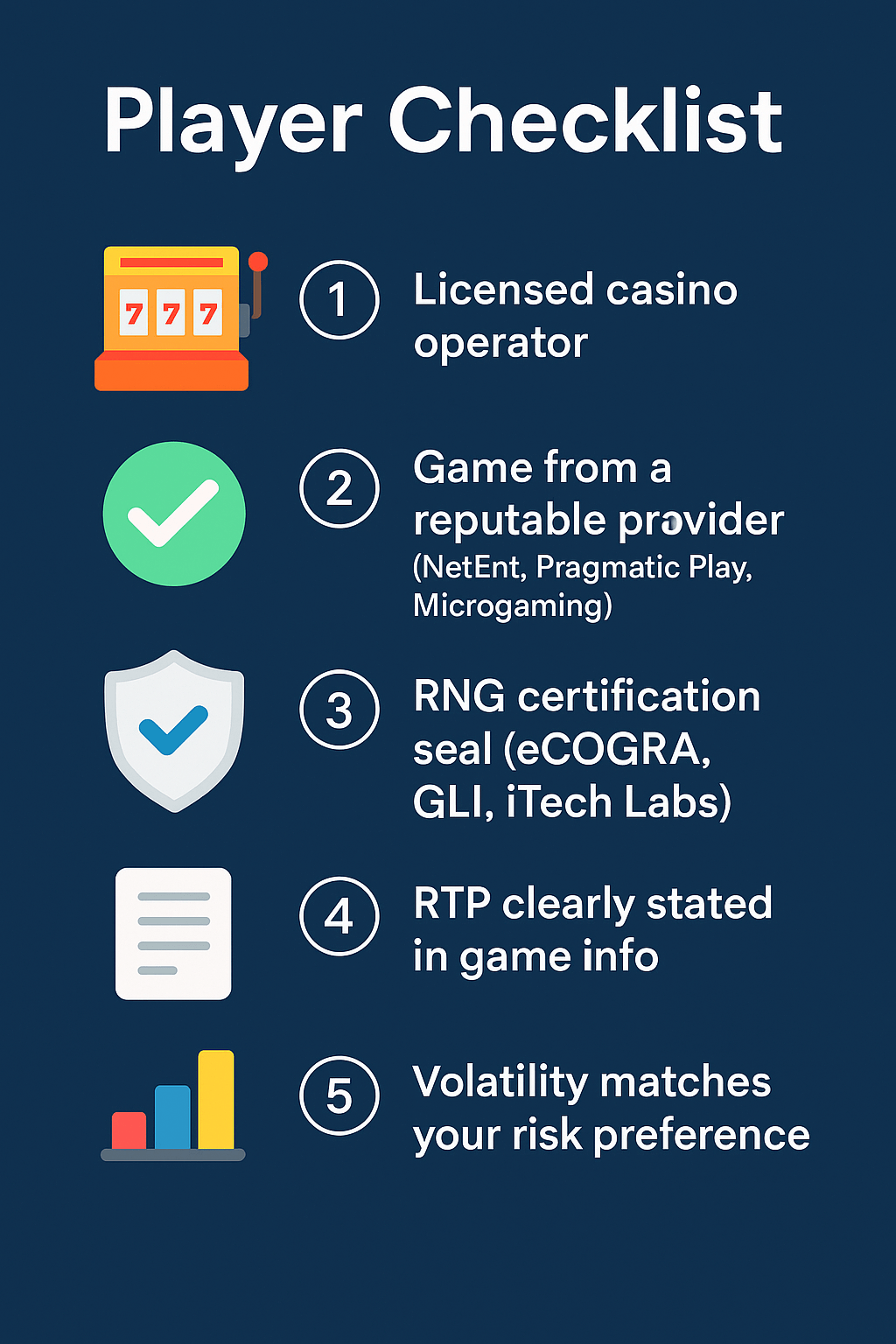
Updated for 2025 — In-depth iGaming Industry Analysis
Whether you’re spinning for fun or chasing that elusive jackpot, every online slot you play runs on one thing: a Random Number Generator (RNG). Understanding how RNG works in online slots isn’t just for techies — it’s key for every player who wants to know the games are fair.
In this guide, we’ll take you deep inside the RNG — the technology, the regulation, the myths, and the facts. We’ll look at how developers implement it, how regulators test it, and most importantly, what it means for your actual chances of winning.
1. What Is an RNG in Online Slots?
A Random Number Generator is the invisible engine inside every online slot, constantly producing random numbers that decide the outcome of each spin.
How RNG Works in Online Slots in Simple Terms
- The RNG produces thousands of random numbers per second in the background.
- When you press Spin, the game takes the current number from the RNG.
- That number maps to a specific outcome — the position of each reel’s symbols.
- The result appears instantly on your screen.
🎯 Key point: Every spin is independent. The previous spin has zero influence on the next.
🔗 Related Reading: Are Online Slots Fair? How RNG Works
2. From Mechanical Reels to Digital RNGs – A Brief History
Before online casinos, physical slot machines used mechanical gears and later electromechanical systems to create random outcomes. Early “RNGs” were simple — often physical stop points on reels.
As technology advanced:
- 1980s–90s: Land-based slots moved to microprocessor-driven PRNGs.
- 2000s: Online slots adopted advanced software-based PRNGs running on secure servers.
- Today: RNGs are cryptographically strong, certified by independent labs, and embedded in the game logic to ensure fairness.
This evolution eliminated predictable mechanical patterns, replacing them with true digital randomness.
3. PRNG vs TRNG – The Technical Side
Online slots use two main types of RNG technology — but one dominates.
True Random Number Generator (TRNG)
- Uses a natural source of randomness (e.g., atmospheric noise).
- Requires special hardware devices.
- Extremely secure, but rarely used in online slots because of cost and complexity.
Pseudo-Random Number Generator (PRNG)
- A mathematical algorithm generates a sequence of numbers that appear random.
- Uses an initial seed value (often based on server time, system events, or cryptographic inputs).
- Can produce billions of possible outcomes before repeating.
- 99% of online slots use PRNGs because they are fast, reliable, and easy to test.
💡 Player takeaway: A well-tested PRNG is as fair and unpredictable as a TRNG in practical terms.
🔗 Related Reading: What Is RTP in Slots? Return to Player Explained
4. How Providers Implement RNGs
Top providers like NetEnt, Pragmatic Play, Hacksaw Gaming, Microgaming, and Play’n GO integrate RNGs directly into their game code.
The Process
- Math Model Design – Developers set RTP, volatility, and hit frequency.
- RNG Integration – The RNG algorithm is coded to deliver outcomes that match the math model.
- Internal Testing – Simulations are run to check fairness.
- Third-Party Certification – Testing labs verify the RNG (e.g., eCOGRA, GLI, iTech Labs).
- Deployment – Game is released to casinos.
📌 Example: Pragmatic Play games are “RNG tested and certified by GLI, Quinel, and Gaming Associates” — a requirement for their licenses.
5. RNG Regulation and Certification Around the World
Europe
- Malta Gaming Authority (MGA) – Requires RNG certificate from an approved lab.
- UK Gambling Commission (UKGC) – Strict technical standards for RNG unpredictability.
- Sweden, Spain, Italy – National regulators demand independent RNG audits.
United States
- Each state (e.g., NJ, PA, MI) has its own Gaming Control Board.
- Games must be tested by GLI or BMM Testlabs before going live.
Asia-Pacific
- Markets like the Philippines require testing for offshore-facing licenses (PAGCOR).
💡 Tip: Licensed casinos list their testing seals (eCOGRA, GLI, iTech Labs) in the site footer or game pages.
🔗 Related Reading: What Is Responsible Gambling? A Beginner’s Guide
6. Myth vs Fact Sidebar

| Myth | Fact |
|---|---|
| Slots run in hot and cold cycles | RNG ensures every spin is independent — no streak memory |
| Casinos can flip a switch to make you lose | In regulated markets, impossible without new certification |
| Jackpot just hit, so it’s cold now | RNG has no memory — odds are always the same |
| You can time spins to win | RNG cycles thousands of numbers per second — timing is irrelevant |
7. How RNGs Affect Your Chances of Winning
An RNG doesn’t change the RTP — it ensures the game produces results consistent with the RTP over time.
Example: A slot with 96% RTP:
- Short term: You could win big or lose quickly.
- Long term: Over millions of spins, ~96% of total wagers are returned to players.
8. Player Checklist (Infographic Section)
Before you spin, check:
- 🎰 Licensed casino operator.
- ✅ Game from a reputable provider (NetEnt, Pragmatic Play, Microgaming).
- 🛡 RNG certification seal (eCOGRA, GLI, iTech Labs).
- 📜 RTP clearly stated in game info.
- 📊 Volatility matches your risk preference.

9. Developer Quotes on RNG Fairness
“Our RNG systems are tested by independent laboratories to ensure truly random, fair, and unbiased outcomes for all players.” — NetEnt Official Statement
“The RNG is the heart of our games — its certification is non-negotiable in every market we enter.” — Pragmatic Play Compliance Team
10. FAQs – RNG in Online Slots
Q: Can I beat the RNG with a strategy?
A: No. RNG outcomes are independent and unpredictable.
Q: Do casinos ever change RNGs?
A: In regulated markets, no. Any change requires re-testing and re-certification.
Q: Is a PRNG less fair than a TRNG?
A: Not in practical gameplay — certified PRNGs are statistically indistinguishable from true randomness.
11. Final Thoughts
The RNG is the unseen guardian of fairness in online slots. For players, understanding how it works means you can play with confidence, focus on enjoyment, and avoid falling for myths.
When you spin on a licensed, regulated platform, you’re in a game where the only deciding factor is luck — not manipulation.